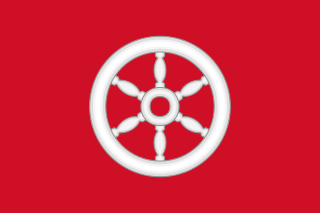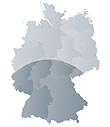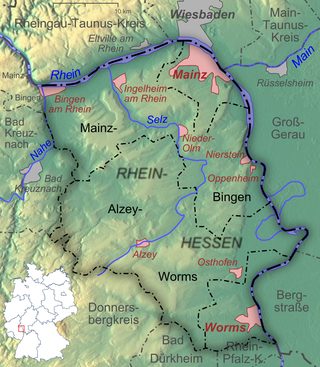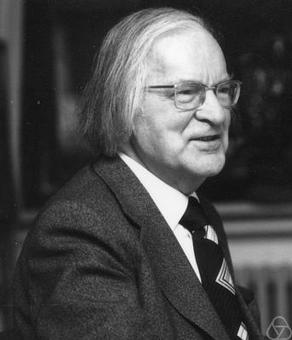
Mainz is the capital and largest city of the German state of Rhineland-Palatinate, and with around 223,000 inhabitants, it is Germany's 35th-largest city. It lies in the Rhine-Main Metropolitan Region—Germany's second-largest metropolitan region after Rhine-Ruhr—which also encompasses the cities of Frankfurt am Main, Wiesbaden, Darmstadt, Offenbach am Main, and Hanau.

The GSI Helmholtz Centre for Heavy Ion Research is a federally and state co-funded heavy ion (Schwerion) research center in the Wixhausen suburb of Darmstadt, Germany. It was founded in 1969 as the Society for Heavy Ion Research, abbreviated GSI, to conduct research on and with heavy-ion accelerators. It is the only major user research center in the State of Hesse.

Aschaffenburg is a town in northwest Bavaria, Germany. The town of Aschaffenburg is not part of the district of Aschaffenburg, but is its administrative seat.
Mainz-Bingen is a district (Kreis) in the east of Rhineland-Palatinate, Germany. Neighboring districts are Rheingau-Taunus, the district-free cities Wiesbaden and Mainz, the districts Groß-Gerau, Alzey-Worms, Bad Kreuznach, and Rhein-Hunsrück.

The Electorate of Mainz, previously known in English as Mentz and by its French name Mayence, was one of the most prestigious and influential states of the Holy Roman Empire. In the hierarchy of the Catholic Church, the Archbishop-Elector of Mainz was also the Primate of Germany, a purely honorary dignity that was unsuccessfully claimed from time to time by other archbishops. There were only two other ecclesiastical Prince-electors in the Empire: the Electorate of Cologne and the Electorate of Trier.

The Johannes Gutenberg University Mainz is a public research university in Mainz, Rhineland Palatinate, Germany. It is named after the printer Johannes Gutenberg since 1946. As of 2018, it had approximately 32,000 students enrolled in around 100 academic programs. The university is organized into 11 faculties.

The Diocese of Mainz, historically known in English as Mentz as well as by its French name Mayence, is a Latin Church ecclesiastical territory or diocese of the Catholic Church in Germany. It was founded in 304, promoted in 780 to Metropolitan Archbishopric of Mainz and demoted back in 1802 to bishopric. The diocese is suffragan diocese in the ecclesiastical province of the metropolitan Archdiocese of Freiburg. Its district is located in the states of Rhineland-Palatinate and Hesse. The seat of the diocese is in Mainz at the Cathedral dedicated to Saints Martin and Stephen.

Southern Germany is a region of Germany that included the areas in which Upper German dialects are spoken, which includes the stem duchies of Bavaria and Swabia in present-day Bavaria, Baden-Württemberg, and the southern portion of Hesse and Rhineland-Palatinate that were part of the Duchy of Franconia.

Wörrstadt is a town in the Alzey-Worms district in Rhineland-Palatinate, Germany.

The Max Planck Institute for Polymer Research is a scientific center in the field of polymer science located in Mainz, Germany. The institute was founded in 1983 by Erhard W. Fischer and Gerhard Wegner. Belonging to the Chemistry, Physics and Technology Section, it is one of over 80 institutes in the Max Planck Society (Max-Planck-Gesellschaft).

Rheinhessen is the largest of 13 German wine regions (Weinanbaugebiete) for quality wines with 26,758 hectares under cultivation in 2018. Named for the traditional region of Rhenish Hesse, it lies on the left bank of the Rhine between Worms and Bingen in the federal state of Rhineland-Palatinate. Despite its historic name it is currently no longer part of the federal-state of Hesse, this being the case since the end of World War II. There have been several unsuccessful attempts to legally reunite the former wine growing districts of Mainz on the Hessian side during the post-war area. Rheinhessen produces mostly white wine from a variety of grapes, particularly Riesling, Müller-Thurgau and Silvaner, and is best known as the home of Liebfraumilch, although some previously underrated Rieslings are also made, increasingly in a powerful dry style.
The Mainz University of Applied Sciences, is a 1971-founded university located in Mainz, in the western German state of Rhineland-Palatinate. The University of Applied Sciences Mainz consists of three faculties: School of Technology, School of Design and School of Business. The common feature of all fields of study is the practical orientation of the university, the short periods of study and the internationally orientated courses.

The Rhine-Main Metropolitan Region, often simply referred to as Frankfurt Rhine-Main, Frankfurt Rhine-Main area or Rhine-Main area, is the second-largest metropolitan region in Germany after Rhine-Ruhr, with a total population exceeding 5.8 million. The metropolitan region is located in the central-western part of Germany, and stretches over parts of three German states: Hesse, Rhineland-Palatinate, and Bavaria. The largest cities in the region are Frankfurt am Main, Wiesbaden, Mainz, Darmstadt, Offenbach, Worms, Hanau, and Aschaffenburg.
Worms University of Applied Sciences is a business and technology-oriented university of applied sciences in Worms, Germany. Around 3700 students are taught in 38 degree programmes by 74 professors and around 100 lecturers.
The Institute of Molecular Biology (IMB) is a modern research centre on the campus of the Johannes Gutenberg University in Mainz, Germany. It is funded by the Boehringer Ingelheim Foundation and the state of Rheinland Palatinate. The scientists at IMB primarily conduct basic science in developmental biology, epigenetics, ageing, genome stability and related areas.

The University of Applied Sciences Ludwigshafen is a public university located in Ludwigshafen, Germany. It was founded in 1965 as Higher School of Commerce Ludwigshafen. In 1971 it became part of the University of Applied Sciences Rhineland Palatinate, which split up into seven autonomous universities in 1991.

St. John's Church is located beneath Mainz Cathedral in the historical center of Mainz, Germany. This 1100-year-old church was the first episcopal see of the Bishop of Mainz. It is the oldest church in Mainz, the oldest cathedral in the Germany of today and the only preserved cathedral building from late Carolingian and early Ottonian time in Germany.

The Catholic University of Applied Sciences Freiburg was founded in 1971 through combining several predecessor institutions. It is one of the five Universities of Freiburg and one of the seven Catholic Universities of Applied Sciences in Germany.

Hans Rohrbach was a German mathematician. He worked both as an algebraist and a number theorist and later worked as cryptanalyst at Pers Z S, the German Foreign Office cipher bureau, during World War II. He was latterly known as the person who broke the American diplomatic O-2 cypher, a variant of the M-138-A strip cipher during 1943. Rohrbach wrote a report on the breaking of the strip cypher when he was captured by TICOM, the allied effort to roundup and seize captured German intelligence people and material.














